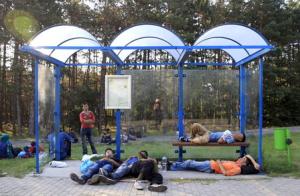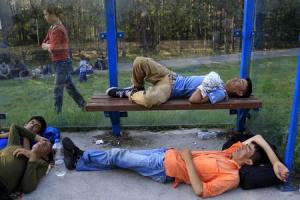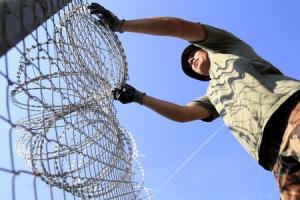By Krisztina Than
BUDAPEST (Reuters) - Ahmed, a Syrian man, and his wife wait with hundreds of other migrants at a railway station in central Budapest hoping to find a smuggler to take them to Germany, the final destination in an exhausting and dangerous journey.
The 27-year-old teacher left the northern Syrian town of Ariha to escape the war but he admits there were moments in the 10-day journey, by foot, rubber boat and train, when the risks were so great he wished they had never left.
"It's a trip... from death to death because we cross forests, seas, mafia, smugglers and more," he says.
They arrived at the railway station early on Friday, after crossing into country from Serbia by crawling under a barbed-wire fence Hungary has erected along its southern border.
In the sweltering heat, families with babies and small kids lie around on blankets and in makeshift tents in a transit zone in front of the station.
Kids play volleyball, oblivious to a silent ceremony on the steps leading to the train station in memory of the 71 migrants who died in a smugglers' truck found near Vienna on Thursday. Hungarians and some refugees place candles and flowers on the steps and a note: "Europe your hand is covered with blood."
Hundreds of thousands of migrants are trying to reach the European Union, fleeing violence and poverty in the Middle East and Africa. More than 140,000 migrants were caught by Hungarian police on the Serbian border so far this year.
The route to Europe is laden with risks. More than 2,600 migrants are thought to have drowned already this year, trying to cross the Mediterranean. Even within the European Union, the last stretch for migrants like Ahmed, via a network of traffickers, is dangerous.
He does not know how long it will take to find a car or truck to Germany, for a trip which will cost him and his wife about 500 euros each. To Vienna, he says, it would be less, around 350 euros.
"If I find a smuggler, I will go with him. To hell, no problem … it's better than sitting here," he says.
"Some of my friends in Germany will send some numbers to me on the WhatsApp. All the connection here (is) with the WhatsApp," he said.
"We don't know to where he (the smuggler) will take us."
Hungarian police have arrested close to 800 people so far this year for human trafficking.
SMUGGLERS AND MAFIA
Ahmed and his wife walked more than 12 hours at night from Syria to Turkey, before they boarded a smugglers' rubber boat with 40 or 50 other people to the Greek island of Samos.
They were lucky, as the sea was calm that day. He said the trip cost around $1,200 per person.
"Our trip in the boat was about two hours in big stress, big fear," he said. They spent two days there in a camp, before taking a boat to Athens.
They were relieved to get to Macedonia after the end of violent clashes between migrants and police who tried to stop thousands of people streaming through to Serbia.
"No violence because there were UN (people): they gave us foods, they gave us water, they gave us medicine, clothes," he said. They took a train to Serbia next.
Serbian police treated them badly, Ahmed said: no beatings but "violence in their words."
He said the camp that awaited them on the Hungarian side near the border, where migrants are first taken by police, was overcrowded and many people had no blankets to sleep on.
Then they were moved to another camp to have their fingerprints taken, a measure many migrants try to avoid as they fear being sent back to Hungary because it is their first point of entry to the Schengen zone of the EU.
"One policeman said to me: look if you don't want the fingerprints no problem, choose: if you want to go to prison for 1 month to 6 months, (or) if you want to put your fingerprints," Ahmed said. "After the camp ...they said go as you will."
The overwhelming majority of migrants who cross into Hungary do not wait for their asylum requests to be processed: they move on to the richer EU states in western Europe.
By Saturday night, there was no sign of Ahmed and his wife at the railway station. A family who had been sitting next to them indicated that they had already moved on.
(Editing by Anna Willard)


